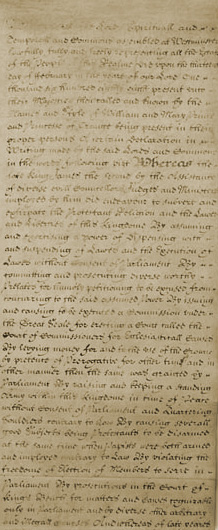The Glorious Revolution
The impact of these ideas steadily increased during the 17th century in England, culminating in the Glorious Revolution of 1688 which enshrined parliamentary sovereignty and the right of revolution, and led to the establishment of what many consider the first modern, liberal state.
Significant legislative milestones in this period included the Habeas Corpus Act of 1679 which strengthened the convention that forbade detention lacking sufficient cause or evidence.
The Bill of Rights (photo left) formally established the supremacy of the law and of parliament over the monarch and laid down basic rights for all Englishmen. The Bill made royal interference with the law and with elections to parliament illegal, made the agreement of parliament necessary for the implementation of any new taxes and outlawed the maintenance of a standing army during peacetime without parliament’s consent. The right to petition the monarch was granted to everyone and “cruel and unusual punishments” were made illegal under all circumstances.
This was followed a year later with the Act of Toleration, which drew its ideological content from John Locke’s four letters advocating religious toleration. The Act allowed freedom of worship to Nonconformists who pledged oaths of Allegiance and Supremacy to the Anglican Church. In 1695, the Commons refused to renew the Licensing of the Press Act 1662, leading to a continuous period of unprecedented freedom of the press.
